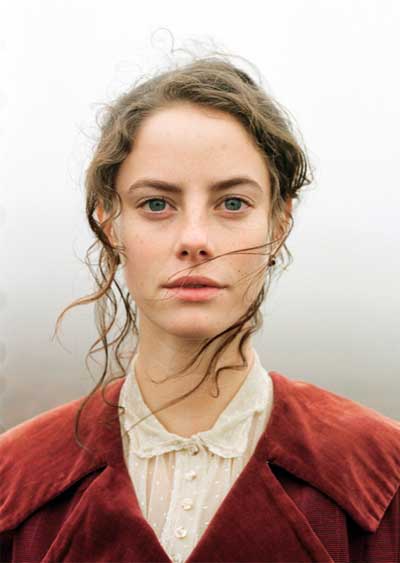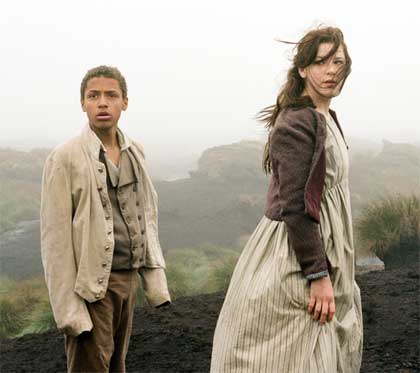Film (2011)
Directed by Andrea Arnold
Written by Andrea Arnold (screenplay), Olivia Hetreed (screenplay), Olivia Hetreed (screen story), Emily Brontë (novel)
Kendall Square Cinema
Cambridge, MA
Cinematography by Robbie Ryan
Film Editing by Nicolas Chaudeurge
With: Solomon Glave (Young Heathcliff), James Howson (Heathcliff), Shannon Beer (Young Catherine Earnshaw), Kaya Scodelario (Catherine Earnshaw), Paul Hilton (Mr. Earnshaw), Jonny Powell (Young Edgar Linton), James Northcote (Edgar Linton), Eve Coverley (Young Isabella Linton), Nichola Burley (Isabella Linton), Steve Evets (Joseph), Lee Shaw (Hindley Earnshaw), Amy Wren (Frances Earnshaw)

Photo by Agatha Nitecka
Courtesy Oscilloscope Films
In this version, Heathcliff is a young teenage black man who is taken in by the Earnshaw family. The young daughter, Catherine, and Heathcliff fall in love. But complications ensue: Catherine gets involved with Edgar Linton and eventually marries him and Heathcliff marries Edgar’s sister, Isabella. But Heathcliff and Catherine never stop loving one another.
This is one of the less satisfying films I have seen in recent memory. It is quite dreary, mostly wordless, and relies on an overabundance of nature shots to convey tone, which, unfortunately, it does not do very well.
The contextualized storytelling that frames other versions of Wuthering Heights has been eliminated, making the narrative context more linear than layered. This does not help the already monotonous tone of this film.
The award-winning 1939 version of Wuthering Heights, directed by William Wyler, based on a script by Charles MacArthur, Ben Hecht and John Huston, and starring Laurence Olivier and Merle Oberon, also extracted from the novel (apparently including the content from about half of its chapters) but seems to have done so more successfully, still maintaining the layered narrative.
In the novel, Wuthering Heights, Heathcliff is described as dark-skinned, but, in this version, he is black. It is not at all obvious from this rendition why this quite different portrayal is justified.

and Shannon Beer as the young Catherine Earnshaw
© 2012 – Oscilloscope Pictures
The young Heathcliff, nobly portrayed by Solomon Glave, is a likeable and vulnerable fellow, but he turns into a brooding young adult.
In this film version, what seems like a reasonably sympathetic treatment of the boy turns into an unaccountably brutish portrayal of the young man. I don’t know if, through this, the filmmaker thought she was employing a racial metaphor with grander implications, but whatever role that metaphor might have played is executed so ambiguously that it makes the racial choice seem gratuitous.
Apart from the lack of character development, the script is very odd in all kinds of ways.
There is almost no dialogue and one is left to discern, from endless lingering shots of Heathcliff’s face, what he is supposed to be thinking.
What there is of dialogue is very strangely selected. After miles of silence, when Heathcliff returns as a wealthy young man, he takes a room in his ancestral home now owned by his unlikeable and now impoverished brother. After paying him rent, he finally utters only a few words, ridiculously: I will need receipts. It is so weirdly incongruous, I can only imagine a Mel Brooks voice-over adding: and could you throw in the last two years of tax returns as well?
Much of the film involves gratuitous nature shots: animals being slaughtered and mistreated, bugs and flowers bouncing around, worms eating fruit, branches banging against a window. I am all for intelligently done visual poetry in cinema, but I did not find it here, and the failed attempt took up a lot of time during which we might have learned a little something about the characters.
The young Catherine (Shannon Beer) is a quite good actress, despite that she’s given barely anything with which to work. And the older Catherine (Kaya Scodelario) has a magnetic charm which, despite the awful lines she does have, creates a certain aura. When, in the end, the elder Catherine has to say to Heathcliff you and Edgar broke my heart, it is so patently ridiculous that one can only sigh.
Almost the whole film has a naturalistic soundtrack with no music except for a little song a character sings here or there, until the credits roll, when an American folk-style ballad comes careening out of nowhere.
The tone of this film is basically a grim and sullen monotone. Done convincingly, that would have been ok. But, here, one annoyingly dreary and unrevealing scene follows the next.
The film is itself quite long – about two hours – though it feels much longer than that.
– BADMan
Leave a Reply